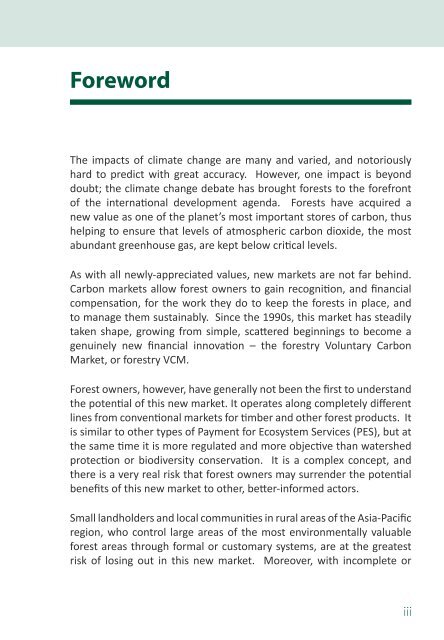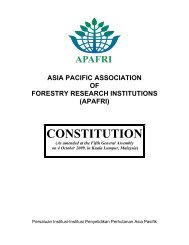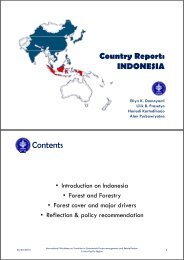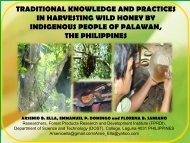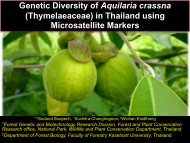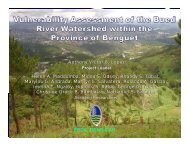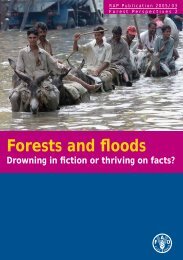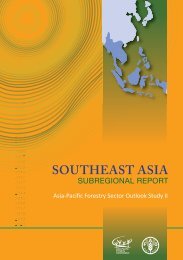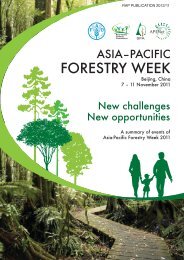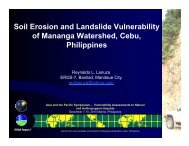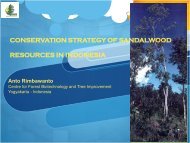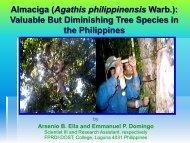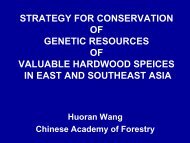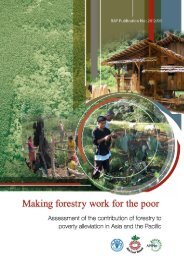- Page 2 and 3: RAP PUBLICATION 2012/16 Community g
- Page 6 and 7: Table of Contents Foreword iii Acro
- Page 8 and 9: List of Boxes Box 1: Grouped projec
- Page 10 and 11: SFE SFM SOC SOP UNFCCC USAID VCM VC
- Page 12 and 13: Afforestation, Reforestation & Re-v
- Page 14 and 15: Climate Change Adaptation 5 Adjustm
- Page 16 and 17: minimum threshold values at maturit
- Page 18 and 19: (PD) is an official term under one
- Page 20: obtaining and maintaining project r
- Page 23 and 24: Community guidelines for accessing
- Page 25 and 26: Community guidelines for accessing
- Page 27 and 28: Community guidelines for accessing
- Page 29 and 30: Community guidelines for accessing
- Page 31 and 32: Community guidelines for accessing
- Page 33 and 34: Community guidelines for accessing
- Page 35 and 36: Community guidelines for accessing
- Page 37 and 38: Community guidelines for accessing
- Page 40 and 41: 1 Forests and climate change 19
- Page 42 and 43: Chapter 1: Forests and climate chan
- Page 44 and 45: Chapter 1: Forests and climate chan
- Page 46 and 47: Chapter 1: Forests and climate chan
- Page 48 and 49: Chapter 1: Forests and climate chan
- Page 50: Chapter 1: Forests and climate chan
- Page 53 and 54: Community guidelines for accessing
- Page 55 and 56:
Community guidelines for accessing
- Page 57 and 58:
Community guidelines for accessing
- Page 59 and 60:
Community guidelines for accessing
- Page 61 and 62:
Community guidelines for accessing
- Page 63 and 64:
Community guidelines for accessing
- Page 65 and 66:
Community guidelines for accessing
- Page 67 and 68:
Community guidelines for accessing
- Page 69 and 70:
Community guidelines for accessing
- Page 71 and 72:
Community guidelines for accessing
- Page 73 and 74:
Community guidelines for accessing
- Page 75 and 76:
Community guidelines for accessing
- Page 77 and 78:
Community guidelines for accessing
- Page 79 and 80:
Community guidelines for accessing
- Page 81 and 82:
Community guidelines for accessing
- Page 83 and 84:
Community guidelines for accessing
- Page 85 and 86:
Community guidelines for accessing
- Page 87 and 88:
Community guidelines for accessing
- Page 89 and 90:
Community guidelines for accessing
- Page 91 and 92:
Community guidelines for accessing
- Page 93 and 94:
Community guidelines for accessing
- Page 95 and 96:
Community guidelines for accessing
- Page 97 and 98:
Community guidelines for accessing
- Page 99 and 100:
Community guidelines for accessing
- Page 101 and 102:
Community guidelines for accessing
- Page 103 and 104:
Community guidelines for accessing
- Page 105 and 106:
Community guidelines for accessing
- Page 107 and 108:
Community guidelines for accessing
- Page 109 and 110:
Community guidelines for accessing
- Page 111 and 112:
Community guidelines for accessing
- Page 113 and 114:
Community guidelines for accessing
- Page 115 and 116:
Community guidelines for accessing
- Page 117 and 118:
Community guidelines for accessing
- Page 119 and 120:
Community guidelines for accessing
- Page 121 and 122:
Community guidelines for accessing
- Page 123 and 124:
Community guidelines for accessing
- Page 125 and 126:
Community guidelines for accessing
- Page 127 and 128:
Community guidelines for accessing
- Page 129 and 130:
Community guidelines for accessing
- Page 131 and 132:
Community guidelines for accessing
- Page 133 and 134:
Community guidelines for accessing
- Page 136 and 137:
5 Project implementation: field wor
- Page 138 and 139:
Chapter 5: Project implementation:
- Page 140 and 141:
Chapter 5: Project implementation:
- Page 142 and 143:
Chapter 5: Project implementation:
- Page 144 and 145:
Chapter 5: Project implementation:
- Page 146 and 147:
Chapter 5: Project implementation:
- Page 148 and 149:
Chapter 5: Project implementation:
- Page 150 and 151:
Chapter 5: Project implementation:
- Page 152 and 153:
Chapter 5: Project implementation:
- Page 154 and 155:
Chapter 5: Project implementation:
- Page 156 and 157:
Chapter 5: Project implementation:
- Page 158 and 159:
Chapter 5: Project implementation:
- Page 160 and 161:
6 Identifying, managing and quantif
- Page 162 and 163:
Chapter 6: Identifying, managing an
- Page 164 and 165:
Chapter 6: Identifying, managing an
- Page 166 and 167:
Chapter 6: Identifying, managing an
- Page 168 and 169:
Chapter 6: Identifying, managing an
- Page 170 and 171:
Chapter 6: Identifying, managing an
- Page 172 and 173:
Chapter 6: Identifying, managing an
- Page 174 and 175:
Chapter 6: Identifying, managing an
- Page 176 and 177:
7 Further help and advice 155
- Page 178 and 179:
Chapter 7: Further help and advice
- Page 180 and 181:
Chapter 7: Further help and advice
- Page 182 and 183:
Background information Table 9: Sou
- Page 184 and 185:
Chapter 7: Further help and advice
- Page 186 and 187:
Chapter 7: Further help and advice
- Page 188 and 189:
Chapter 7: Further help and advice
- Page 190 and 191:
Chapter 7: Further help and advice
- Page 192 and 193:
ANNEXES 171
- Page 194 and 195:
ANNEX I Part 1: Project description
- Page 196 and 197:
ANNEX I Describe the current and al
- Page 198 and 199:
ANNEX I Project Proponent(s) Name o
- Page 200 and 201:
ANNEX I Current status of acceptanc
- Page 202 and 203:
ANNEX I Baseline scenario What woul
- Page 204 and 205:
ANNEX I poverty alleviation, foreig
- Page 206 and 207:
ANNEX I Grants Give name of the org
- Page 208 and 209:
ANNEX I Part 4: Institutional detai
- Page 210 and 211:
ANNEX I Incentive systems List exis
- Page 212 and 213:
ANNEX II Annex II: VCS PD template
- Page 214 and 215:
ANNEX III Annex III: Example outlin
- Page 216 and 217:
ANNEX III 3.4.5. Non-timber forest
- Page 219:
ISBN 978-92-5-107322-3 9 7 8 9 2 5


